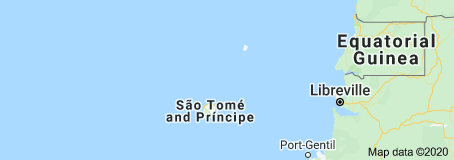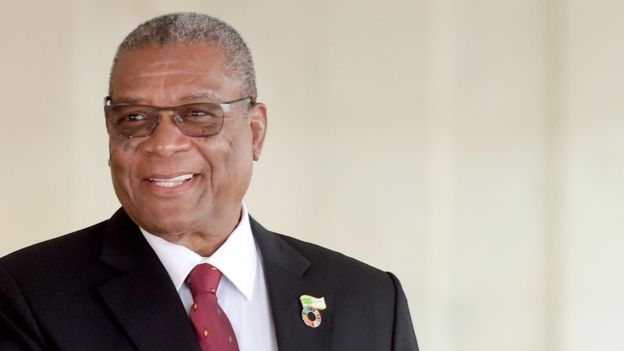
Sao Tome and Principe

Brief Overview
The Republic of Sao Tome and Principe (STP) is a lower middle income, developing, small island state with a fragile economy. It is highly vulnerable to exogenous shocks. An archipelago divided into six districts and the Autonomous Region of Príncipe (Região Autónoma do Príncipe), it is located in the Gulf of Guinea, 350 km off the west coast of Africa. With a surface area of 1,001 sq. km, this Portuguese-speaking country has a population of nearly 200,000 people, and a Gross National Income (GNI) per capita of $1,890 as of 2018.
Political Context
The results of the October 7, 2018 elections reinforced the notion of Sao Tome and Principe being a model of democratic alternation in Central Africa. The Movement for the Liberation of Sao Tome and Principe – Social Democrat Party (MLSTP-PSD) now leads the government, thanks to a post-election agreement with the coalition PCD-MDFM-UDD which gives them a majority in parliament.
The National Assembly is comprised of 55 seats, of which 25 are currently held by the Independent Democratic Action Party (ADI), 23 by the MLSTP-PSD, five by the coalition PCD-MDFM-UDD and two by the Sao Tome and Principe Independent Citizen Movement (MCISTP).
Social Context
Despite methodological issues, there is a consensus that poverty incidence has not changed significantly between the last two household surveys (2000 and 2010). Recent World Bank estimates show that about one-third of the population lives on less than $1.9 per day, and more than two-thirds of the population is poor, using a poverty line of $3.2 per day.
STP performs higher than the Sub-Saharan Africa average on the United Nations Development Programme Human Development Index and has made progress improving other social indicators. It has a gross primary school enrollment of 110%, a life expectancy of 66 years, a mortality rate of children under five years old of 51 per 1,000 live births, access to an improved water source for 97% of the population, and access to electricity for 60% of the population.

The Democratic Republic of Sao Tome and Principe
Capital: Sao Tome
Population 172,000
Area: 1,001 sq km (386 sq miles)
Major language: Portuguese
Religion: Christianity
Life expectancy: 64 years (men), 66 years (women)
Currency dobra

Economic Developments and Outlook
STP faces challenges that are typical of small and insular states and affect its ability to deal with shocks and achieve a balanced budget. The limited number of people and workers in the country often prevent the efficient production of goods and services at the scale needed to meet the demand of both local and export markets. Its remoteness and insularity increase export costs, and the limited availability of land and small workforce prevent the country from diversifying its economy, making it more vulnerable to terms-of-trade shocks. The indivisibility in the production of public goods, and the difficulty of providing services to a scattered population imply a high cost of public goods and a high level of public expenditures.
STP has grown, driven by agriculture, tourism, oil-fueled foreign direct investment, but mostly by government expenditure propelled by external aid and government borrowing. Gross domestic product (GDP) has grown at an average rate of 4.5% between 2009 to 2017 but has been decelerating since 2014. The slowdown in growth has been caused by lower government spending on the back of reduced external aid, lower tax revenues, and government overborrowing. The economy was severely hit in 2018, by an energy crisis that in its most acute time reduced energy supply by 75%.
Development challenges
STP will continue to face significant challenges to overcome insularity, small market size, vulnerability to natural shocks and climate change, limited human capital, and scarce tradable resources to generate sustainable and inclusive growth and reduce poverty.
The long-term challenge for STP is to move from ambitious plans to feasible actions that will help make the economy more dynamic and generate more jobs for the youth population.
Physical Contacts of the Presidency
Name of Minister:
Address:
Telephone:
Fax:
Physical Contacts of the Prime Minister’s Office
Name of Minister:
Address:
Telephone:
Fax:
Physical Contacts of the National Assembly
Name of Speaker of the House:
Address:
Telephone:
Fax:
Physical Contacts of the Chief Of State and Cabinet Ministers
Name of Minister:
Address:
Telephone:
Fax:
Physical Contacts of the Ministry of Interior
Name of Minister:
Address:
Telephone:
Fax
Physical Contacts of the Ministry of Justice
Name of Minister:
Address:
Telephone:
Fax:
Physical Contacts of the Ministry of Foreign Affairs
Name of Minister:
Address:
Telephone:
Fax:
Physical Contacts of the Ministry of Women’s Affairs
Name of Minister:
Address:
Telephone:
Fax:
Physical Contacts of the National Human Rights Commission
Name of Minister:
Address:
Telephone:
Fax:
Physical Contacts of the Police
Name of Inspector General:
Address:
Telephone:
Fax:
Physical Contacts of the Military
Name of Inspector General:
Address:
Telephone:
Fax:
Important Information of Key Human Rights Issues in Seychelles
Number Prisons in Sao Tome and Principe
Number Prisoners in Sao Tome and Principe:
Secret Detention Centres:
Police Stations in Sao Tome and Principe
Corruption in Sao Tome and Principe
What are the current and ongoing human rights issues in Sao Tome and Principe?
(1) Freedom of the Press
(2) Human Rights Defenders Issues
(3) Impunity
African Union (AU)
Joined the OAU in
Signed the Constitutive Act of The African Union on:
Ratified:Instrument Deposited:
Signed:
Ratified:
Instrument Deposited:
Signed:
Ratified:
Instrument Deposited:
Signed: –
Ratified: –
Instrument Deposited: –
4.Protocol on Amendments to the Protocol on the Statute of the African Court of Justice and Human Rights
Signed: –
Ratified: –
Instrument Deposited: –
Signed: –
Ratified: –
Instrument Deposited: –
Signed: –
Ratified: –
Instrument Deposited: –
Signed: –
Ratified: –
Instrument Deposited: –
Signed: –
Ratified: –
Instrument Deposited: –
Signed: –
Ratified: –
Instrument Deposited: –
Signed: –
Ratified: –
Instrument Deposited: –
Signed: –
Ratified: –
Instrument Deposited: –
Signed: –
Ratified: –
Instrument Deposited: –
Signed: –
Ratified: –
Instrument Deposited: –
Signed: –
Ratified: –
Instrument Deposited: –